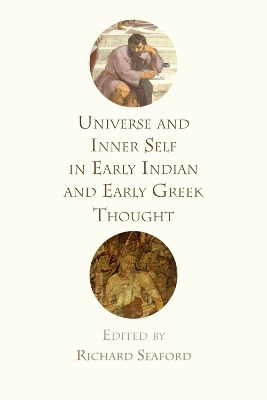
Universe and Inner Self in Early Indian and Early Greek Thought
Seiten
2016
Edinburgh University Press (Verlag)
978-1-4744-1099-1 (ISBN)
Edinburgh University Press (Verlag)
978-1-4744-1099-1 (ISBN)
This volume brings together Hellenists and Indologists representing a variety of perspectives on the similarities and differences between the two cultures. It offers a collaborative contribution to the burgeoning interest in the Axial Age and will be of interest to anyone intrigued by the big questions inspired by the ancient world.
From the sixth century BCE onwards there occurred a revolution in thought, with novel ideas such as such as that understanding the inner self is both vital for human well-being and central to understanding the universe. This intellectual transformation is sometimes called the beginning of philosophy. And it occurred independently it seems - in both India and Greece, but not in the vast Persian Empire that divided them. How was this possible? This is a puzzle that has never been solved.
This volume brings together Hellenists and Indologists representing a variety of perspectives on the similarities and differences between the two cultures, and on how to explain them. It offers a collaborative contribution to the burgeoning interest in the Axial Age and will be of interest to anyone intrigued by the big questions inspired by the ancient world.
From the sixth century BCE onwards there occurred a revolution in thought, with novel ideas such as such as that understanding the inner self is both vital for human well-being and central to understanding the universe. This intellectual transformation is sometimes called the beginning of philosophy. And it occurred independently it seems - in both India and Greece, but not in the vast Persian Empire that divided them. How was this possible? This is a puzzle that has never been solved.
This volume brings together Hellenists and Indologists representing a variety of perspectives on the similarities and differences between the two cultures, and on how to explain them. It offers a collaborative contribution to the burgeoning interest in the Axial Age and will be of interest to anyone intrigued by the big questions inspired by the ancient world.
Richard Seaford is Emeritus Professor of Ancient Greek at the Univerity of Exeter. He has been a Fellow of the National Humanities Center in North Carolina, Distinguished Visiting Professor at the University of Texas at Austin, and President of the Classical Association (UK). He is the author of numerous articles and books ranging from Homer to the New Testament.
| Zusatzinfo | Illustrations |
|---|---|
| Verlagsort | Edinburgh |
| Sprache | englisch |
| Maße | 156 x 234 mm |
| Gewicht | 631 g |
| Themenwelt | Geschichte ► Allgemeine Geschichte ► Vor- und Frühgeschichte |
| Geisteswissenschaften ► Philosophie ► Erkenntnistheorie / Wissenschaftstheorie | |
| Geisteswissenschaften ► Philosophie ► Östliche Philosophie | |
| Geisteswissenschaften ► Philosophie ► Philosophie Altertum / Antike | |
| ISBN-10 | 1-4744-1099-5 / 1474410995 |
| ISBN-13 | 978-1-4744-1099-1 / 9781474410991 |
| Zustand | Neuware |
| Haben Sie eine Frage zum Produkt? |
Mehr entdecken
aus dem Bereich
aus dem Bereich
auf den Spuren der frühen Zivilisationen
Buch | Hardcover (2023)
C.H.Beck (Verlag)
CHF 27,95
Konzepte – Methoden – Theorien
Buch | Softcover (2024)
UTB (Verlag)
CHF 55,85
Was Pompeji über uns erzählt
Buch | Hardcover (2023)
Propyläen (Verlag)
CHF 44,75


